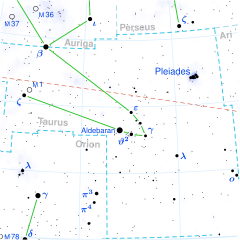天街增四
天街增四(金牛座72,缩写为72 Tau)在黄道星座金牛座,可能是联星。它的视星等为+5.5,但与较亮的天街增三(金牛座υ)距离只有0.29°,因此裸眼不易看见。依据从地球测得的年周视差7.9mas,它与太阳的距离大约是410光年。
| 观测资料 历元 J2000.0 | |
|---|---|
| 星座 | 金牛座 |
| 星官 | |
| 赤经 | 04h 27m 17.4508s[1] |
| 赤纬 | +22° 59′ 46.778″[1] |
| 视星等(V) | 5.514[2] |
| 特性 | |
| 演化阶段 | 主序星[1] |
| 光谱分类 | B7V[3] |
| U−B 色指数 | −0.48[4] |
| B−V 色指数 | −0.10[4] |
| 天体测定 | |
| 径向速度 (Rv) | 32.2±1.1[5] km/s |
| 自行 (μ) | 赤经:−1.409[1] mas/yr 赤纬:−13.722[1] mas/yr |
| 视差 (π) | 7.9390 ± 0.398[1] mas |
| 距离 | 410 ± 20 ly (126 ± 6 pc) |
| 绝对星等 (MV) | +0.21[6] |
| 详细资料 | |
| 质量 | 3.47[1] M☉ |
| 半径 | 2.8[1] R☉ |
| 表面重力 (log g) | 3.97[1] |
| 亮度 | 185[1] L☉ |
| 温度 | 12,689[1] K |
| 自转速度 (v sin i) | 115[7] km/s |
| 年龄 | 38[8] Myr |
| 其他命名 | |
| 参考数据库 | |
| SIMBAD | 资料 |
性质
编辑天街增四是一颗光谱为B7V的B型主序星 [3],质量为3.48 M☉,和估计年龄约3,800万年[8]。它的大小是太阳的2.8倍,光度是太阳的185倍[1]。
虽然,这个恒星系统被赋予拜耳名称 "金牛座υ2",与"金牛座υ"在天球上的距离只有0.29°[4]。事实上,天街增三(金牛座υ)是一颗前景恒星,两者不相关[11],尽管天街增四(金牛座72)位于疏散星团毕宿星团附近,但它离我们很远[1]。
天街增四位于黄道附近,因此有时会被月球遮蔽。1985年对掩星的观测表明,它有一颗相距0.1″的伴星[12]。现时还没有证实这一发现,其他来源仍将这颗恒星列为单星[13]。
参考资料
编辑- ^ 1.00 1.01 1.02 1.03 1.04 1.05 1.06 1.07 1.08 1.09 1.10 1.11 1.12 Vallenari, A.; et al. Gaia Data Release 3. Summary of the content and survey properties. Astronomy & Astrophysics. 2022. arXiv:2208.00211 . doi:10.1051/0004-6361/202243940 . 已忽略未知参数
|collaboration=(帮助) Gaia DR3 record for this source at VizieR. - ^ Høg, E.; et al. The Tycho-2 catalogue of the 2.5 million brightest stars. Astronomy and Astrophysics. 2000, 355: L27–L30. Bibcode:2000A&A...355L..27H.
- ^ 3.0 3.1 Mooley, Kunal; et al. B- and A-type Stars in the Taurus-Auriga Star-forming Region. The Astrophysical Journal. July 2013, 771 (2): 24. Bibcode:2013ApJ...771..110M. S2CID 2176170. arXiv:1306.0598 . doi:10.1088/0004-637X/771/2/110. 110.
- ^ 4.0 4.1 4.2 Hoffleit, D.; Jaschek, C. The Bright Star Catalogue. New Haven: Yale University Observatory. 1991. Bibcode:1991bsc..book.....H.
- ^ Gontcharov, G. A. Pulkovo Compilation of Radial Velocities for 35 495 Hipparcos stars in a common system. Astronomy Letters. November 2006, 32 (11): 759–771. Bibcode:2006AstL...32..759G. ISSN 1063-7737. S2CID 119231169. arXiv:1606.08053 . doi:10.1134/S1063773706110065.
- ^ Anderson, E.; Francis, Ch. XHIP: An extended hipparcos compilation. Astronomy Letters. 2012, 38 (5): 331. Bibcode:2012AstL...38..331A. S2CID 119257644. arXiv:1108.4971 . doi:10.1134/S1063773712050015.
- ^ Freire Ferrero, R.; et al. High Ionization Species in the Nearby Interstellar Medium from an Exhaustive Analysis of the IUE INES Database. The Astronomical Journal. February 2012, 143 (2): 38. Bibcode:2012AJ....143...28F. doi:10.1088/0004-6256/143/2/28 . 28.
- ^ 8.0 8.1 Gullikson, Kevin; Kraus, Adam; Dodson-Robinson, Sarah. The Close Companion Mass-ratio Distribution of Intermediate-mass Stars. The Astronomical Journal. 25 July 2016, 152 (2): 40. Bibcode:2016AJ....152...40G. arXiv:1604.06456 . doi:10.3847/0004-6256/152/2/40 . eISSN 1538-3881.
- ^ 72 Tau. SIMBAD. 斯特拉斯堡天文资料中心.
- ^ Kostjuk, N. D. VizieR Online Data Catalog: HD-DM-GC-HR-HIP-Bayer-Flamsteed Cross Index (Kostjuk, 2002). VizieR On-line Data Catalog: IV/27A. Originally Published in: Institute of Astronomy of Russian Academy of Sciences (2002). 2004, 4027. Bibcode:2004yCat.4027....0K.
- ^ Vallenari, A.; et al. Gaia Data Release 3. Summary of the content and survey properties. Astronomy & Astrophysics. 2022. arXiv:2208.00211 . doi:10.1051/0004-6361/202243940 . 已忽略未知参数
|collaboration=(帮助) Gaia DR3 record for this source at VizieR. - ^ Qian, B. -C; Zhu, G. -L.; Fan, Q. -Y. The measurements of stellar angular diameter by photoelectric observation of lunar occultation. Acta Astronomica Sinica. 1987, 28: 45. Bibcode:1987AcASn..28...39Q.
- ^ Eggleton, P. P.; Tokovinin, A. A. A catalogue of multiplicity among bright stellar systems. Monthly Notices of the Royal Astronomical Society. September 2008, 389 (2): 869–879. Bibcode:2008MNRAS.389..869E. S2CID 14878976. arXiv:0806.2878 . doi:10.1111/j.1365-2966.2008.13596.x.
